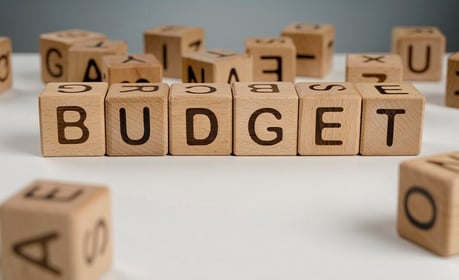The Power of Budgeting
Master your Finances by managing the power of budgeting
FINANCIAL MANAGEMENT
The power of budgeting is undeniable, as it serves as a potent tool for achieving financial stability and success. So in today's blogpost we will be discussing about the power of budgeting. We might wonder why budgeting is such a hot topic, but let us assure you, it's not just about pinching pennies or depriving ourselves of life's pleasures. Budgeting is a key tool that can transform our financial life, giving us the freedom to achieve our goals and secure our future.


What exactly is a budget?
A budget is a plan we create to determine how much money we will spend each month.
We can ensure that we have enough money each month by using a budget. Without a budget, we can run out of money before our next pay period.
Having a budget reveals:
how much money we earn.
how we spend our money.
Thus having a budget means having a financial plan that outlines how we will allocate and manage our money. It is a tool that helps us track our income, expenses, and savings, ensuring that we are making conscious and informed decisions about our finances. Having a budget is crucial for several reasons:
Financial Awareness: A budget gives us a clear understanding of where our money comes from and where it goes. It helps us identify our spending patterns and habits, allowing us to see areas where we might be overspending or areas where we can cut back.
Goal Setting: With a budget, we can set specific financial goals, such as paying off debt, building an emergency fund, saving for a vacation, or investing for the future. Having these goals in mind helps us stay motivated and focused on our financial objectives.
Control Over Spending: Budgeting empowers us to take control of our spending. By allocating a certain amount to each expense category, we become more mindful of our purchases and are less likely to make impulsive decisions.
Debt Management: A budget is an effective tool for managing debt. By allocating funds to pay off debts systematically, we can work towards becoming debt-free more efficiently.
Saving and Investing: Budgeting ensures that we set aside money for savings and investments regularly. Whether it's for short-term goals or long-term financial security, having a budget helps us prioritize saving and investing.
Emergency Preparedness: A budget allows us to create an emergency fund to handle unexpected expenses. Having this safety net provides peace of mind during difficult times.
Financial Flexibility: With a budget, we can adapt to changes in our financial situation more easily. Whether it's a fluctuation in income or an unexpected expense, having a budget helps us adjust our spending accordingly.
Reduced Stress: By knowing exactly where our money is going and having a plan in place, we reduce financial stress and anxiety. Budgeting gives us a sense of control and confidence in managing our finances.
Improved Financial Decision-making: When we have a budget, we can make more informed and rational financial decisions. It allows us to evaluate the trade-offs and make choices that align with our priorities and values.


Why do we need a budget?
We need a budget because:
Our financial situation influences our choice of what we must purchase with our money.
By budgeting we can decide if we can spend more money on some things while spending less money on others.
For instance, our budget might indicate that we spend $300 on clothing each month. We may determine that $125 can be spent on clothing while the remaining funds can be used to cover expenses or be saved for something else.
Why should we make an effort to save money?
Saving money is important because it helps us achieve our goals, be prepared for emergencies, and have a secure and comfortable future. Budgeting helps us in the following ways:
Achieving Goals: When we save money, we can use it to buy things we want or do things we enjoy, like going on a vacation, buying a new phone, or starting a hobby. Saving allows us to turn our dreams into reality.
Emergency Preparedness: Life is full of unexpected events like car repairs or medical emergencies. When we have savings, we can handle these situations without stress and worry. It gives us peace of mind knowing that we can take care of ourselves and our families during tough times.
Financial Security: Saving money builds a safety net for the future. It helps us prepare for big life events like buying a house, starting a family, or retiring comfortably. Having savings ensures that we won't struggle financially when important moments come along.
Less Stress: When we have money set aside, we worry less about financial problems. Saving allows us to feel more relaxed and confident, knowing we can handle life's challenges.
Independence: Having savings gives us more freedom and independence. We won't have to rely on others or go into debt to meet our needs and desires.
Opportunities: Saving money opens up opportunities for growth and improvement. Whether it's investing in education or starting a small business, having savings enables us to take advantage of new possibilities.
Retirement: As we get older, we may not be able to work as much or as hard. Saving for retirement ensures we can enjoy our golden years comfortably without financial struggles.
How should we make a budget:
Preparing a budget can be a simple and essential for managing our finances efficiently. The budgeting process can be achieved by following these steps:
Gather Financial Information: Start by collecting all your financial information, including your income sources (such as salary, bonuses, or side hustles) and your regular expenses (like rent/mortgage, utilities, groceries, transportation, etc.). Income is the money that we make and expense is the money that we spend. If our incomes exceed our expenses, we have surplus money. But if our expenses exceed our incomes we have a deficit.
Categorize Your Expenses: Divide your expenses into categories, such as housing, utilities, groceries, transportation, entertainment, savings, and debt payments. This step helps you see a clear breakdown of where your money goes.
Determine Your Income: Calculate your total monthly income by adding up all your earnings. Be sure to use your net income (after taxes and deductions) to get an accurate picture.
List Your Fixed and Variable Expenses: Differentiate between fixed expenses (those that remain constant each month, like rent) and variable expenses (those that fluctuate, like dining out or shopping). List these expenses under the appropriate categories.
Set Financial Goals: Decide on your financial goals, such as building an emergency fund, paying off debts, saving for a trip, or investing for retirement. Assign specific amounts to each goal and prioritize them based on importance.
Construct a Budget Template: To construct a budget template, use a spreadsheet or a budgeting tool. If you'd rather, you can also use pen and paper. Columns for income, expenses, and the difference between the two should be included in your template.
Allocate Your Income: Begin by allocating your income to each category of expense on your budget template. Make sure that all of your expenses do not outweigh all of your income. If they do, go back and reassess your spending.
Save and Invest: Spend less and save more by setting aside some of your salary for savings and investing. By putting money aside for your financial goals before spending on non-essentials, you can pay yourself first.
Monitor and Adjust: Once you start implementing your budget, track your expenses regularly. Use receipts, online banking, or budgeting apps to see if you are sticking to your budget. If necessary, adjust your spending to stay on track with your financial goals.
Be Flexible and Realistic: Remember that life is unpredictable, and your budget may need adjustments over time. Be flexible and realistic in your approach, and don't be too hard on yourself if things don't go as planned.
How can we use our Budget?
We can use our budget as a powerful tool to manage our finances effectively and work towards your financial goals. Here are some ways to use our budget:
Expense Tracking: Monitor your actual spending against the budgeted amounts regularly. This will help you stay on top of your finances and identify areas where you may be overspending.
Decision Making: Before making any significant financial decisions, refer to your budget to ensure you have enough funds allocated for the particular expense or goal.
Prioritization: Your budget helps you prioritize your financial goals. Allocate more funds to high-priority goals, such as paying off debts or building an emergency fund.
Savings and Investments: Use your budget to set aside money for savings and investments. Automate these contributions to make sure you save consistently.
Debt Management: If you have debts, use your budget to allocate extra funds towards debt repayment. This will help you pay off debts faster and save on interest payments.
Emergency Fund: Your budget can help you build and maintain an emergency fund. Allocate a portion of your income each month to create a financial safety net.
Adjustments: Life changes, and your budget should adapt accordingly. Use your budget to make necessary adjustments when circumstances change, such as a job change or a new expense.
Long-Term Planning: Use your budget as a foundation for long-term financial planning, such as retirement savings or major life events.
Financial Accountability: Having a budget keeps you accountable for your financial decisions. It helps you make conscious choices and avoid impulsive spending.
Financial Peace of Mind: Knowing where your money is going and having a plan in place brings peace of mind and reduces financial stress.
In conclusion, budgeting is a powerful tool that empowers individuals to take control of their finances, achieve their financial goals, and lead a more secure and fulfilling life. By understanding our income, expenses, and financial objectives, we can create a roadmap that aligns with our aspirations and ensures a brighter financial future. While it requires discipline and occasional adjustments, the rewards of successful budgeting are immeasurable. From building an emergency fund and paying off debts to saving for our dreams and enjoying a stress-free financial existence, budgeting paves the way to financial freedom. So, let's embrace the art of budgeting, make informed spending decisions, and take charge of our financial destinies. With dedication and perseverance, we can unlock the door to a more prosperous and balanced life.


